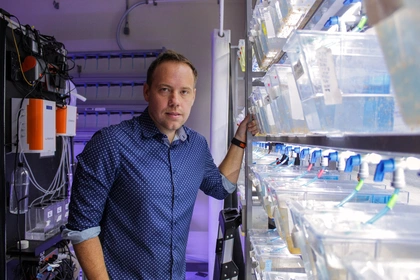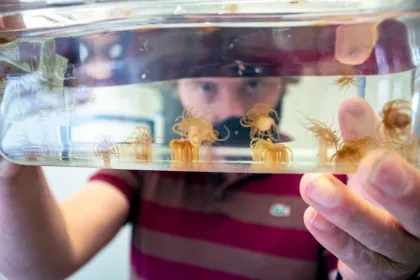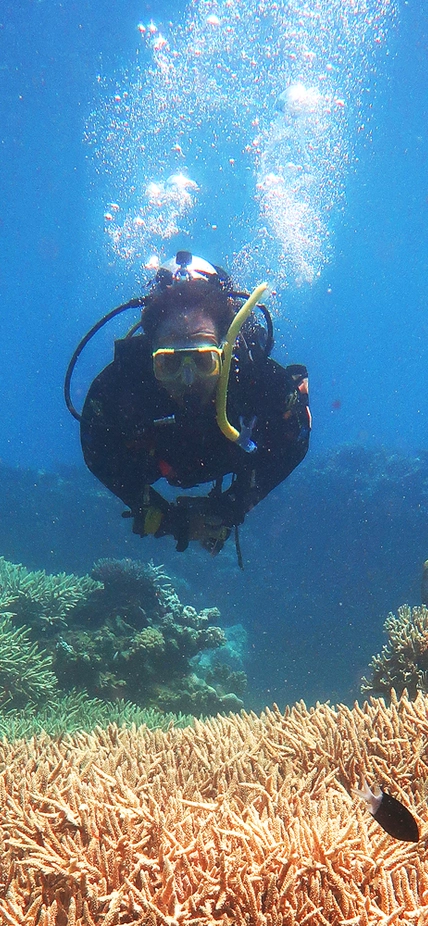
Baltimore, MD—Carnegie Science’s Phillip Cleves is a key collaborator on a new initiative that aims to understand how climate change may impact the nervous systems and behavior of marine animals. Led by UC San Diego’s Scripps Institution of Oceanography, the Allen Discovery Center for Neurobiology in Changing Environments was launched with a $10 million grant from the Paul G. Allen Family Foundation.
The new center’s researchers will work to uncover fundamental mechanisms of marine animals' nervous systems and how they have evolved to function in naturally changing environments. The team’s findings could help predict how marine organisms will respond to climate change and guide conservation efforts for vulnerable species.
Climate change is fundamentally altering the marine environment by cranking up the heat, both making the ocean more acidic and lowering seawater’s oxygen content, because warmer water cannot hold as much oxygen. The speed and scope of these changes can be literally mind bending for ocean creatures. Shifts in temperature and ocean chemistry can alter brain development in early life, change the speed of neural signals, tweak neurotransmitter function or distort the senses of marine organisms.
“The question is how the nervous systems of marine animals deal with natural environmental variability and whether they can adapt to the swiftly changing conditions brought about by anthropogenic climate change,” said Martin Tresguerres, who will lead the new center. “Some species or populations may be more resilient or more vulnerable than others, and we want to identify them and try to understand the mechanisms behind this resiliency or vulnerability.”
At Carnegie Science, Cleves’ lab has been a global leader in deploying biomedical research techniques to reveal the cellular, molecular, and genomic underpinnings of coral symbiosis and coral reef architecture construction. He pioneered the use of CRISPR/Cas9 genome editing tools in coral and anemones and his group’s work continues to inform conservation and rehabilitation strategies in the face of coral bleaching and structural deterioration caused by ocean acidification.
“I am thrilled to be part of this new Allen Discovery Center and to contribute to understanding and protecting fragile marine communities by studying the specific risks climate change poses to the nervous systems of diverse organisms,” Cleves said. “Humanity’s continued use of fossil fuels is putting our oceans in grave peril and our collaborative new research approach will uncover specific physiological and behavioral challenges marine organisms are facing as a result of this carbon pollution. Together, we can find new pathways to resilience.”
The center’s cross-disciplinary research team will study four exemplar marine species: staghorn coral, the slipper snail, the painted sea urchin and the three-spined stickleback fish. They chose the creatures because they represent a diversity of evolutionary lineages that each play important ecological roles.
Other key collaborators include Todd Martz of Scripps and Richard Daneman of UC San Diego School of Medicine, Falko Kuester of the Jacobs School of Engineering and Qualcomm Institute at UC San Diego, Carly Kenkel of the University of Southern California, Tracy Larson of the University of Virginia and Trevor Hamilton of MacEwan University.

The researchers will investigate how warming oceans, decreased oxygen levels, and ongoing ocean acidification impact these animals' nervous systems and behaviors by combining cutting-edge genetic approaches with experiments in the lab and the field. The initiative is being supported through the Paul G Allen Frontiers Group, which enables cutting-edge bioscience around the world.
“The lens of climate change is entirely new for the Frontiers Group, and the timely work of the Allen Discovery Center is critical to understanding the consequences of the climate crisis on the nervous system and to identify potential mechanisms of resilience and adaptation,” said executive vice president and director Kathryn Richmond. “The team’s commitment to disseminating their discoveries both within the scientific community and the public is a tremendous benefit and will enhance and expand the lasting impact of this important work."
The center’s primary research goals include developing neural maps for each of the four species, examining how environmental changes affect each animal’s behavior and sensory perception, and identifying genetic variations that may help some animals adapt to changing oceans. The overarching goal is to identify mechanisms that provide either resilience or vulnerability to the neurobiological impacts of climate change in the oceans. In the process of pursuing these research avenues, the team will develop new tools and techniques for studying marine animal neurobiology that will hopefully spur further research in this understudied arena.
In addition to its scientific goals, the new center has a strong commitment to sharing its findings and tools with the global research community and training the next generation of researchers, especially those from groups underrepresented within the sciences.
The center will directly support trainee positions of undergraduate students, graduate students and postdoctoral scholars. The team will also organize hybrid onsite-online workshops and conferences aimed at training ecologists in neuroscience and neuroscientists in ecology, with fellowships to attend geared towards scientists from developing countries. To bring the excitement of this research to the general public, the center will partner with Birch Aquarium at Scripps to create public education programs.
